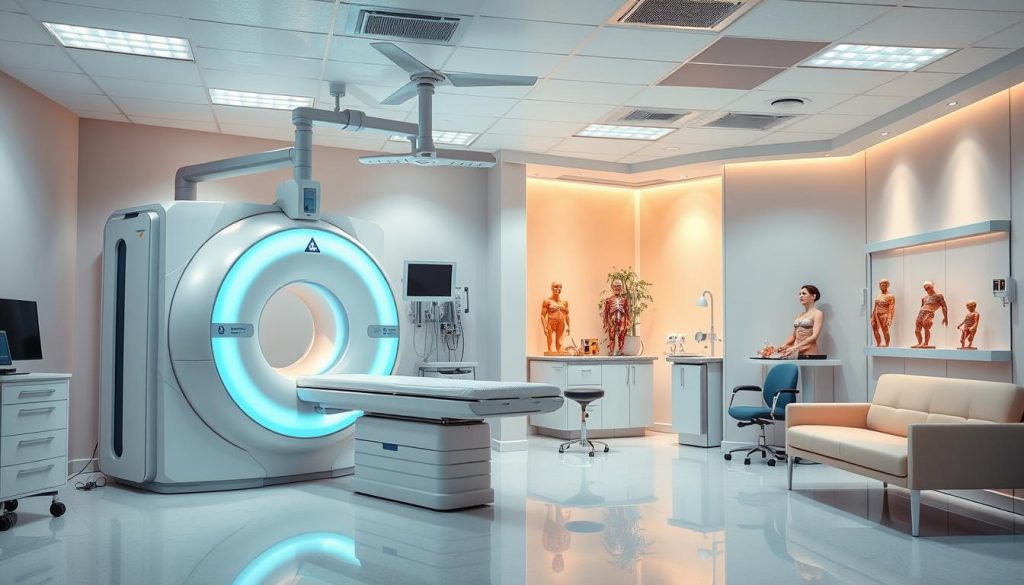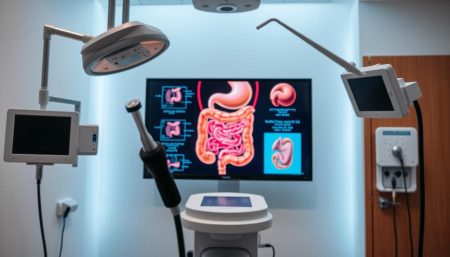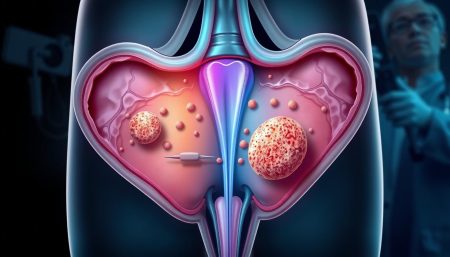When you’re told you have anal cancer, many questions pop up. One big one is, “is anal cancer curable?” Understanding this disease can be tough, with lots of medical terms and stats. But, there’s hope. Thanks to better detection and new treatments, more people are surviving.
This guide aims to help you understand. We’ll look at what affects your chances of beating the disease. And what it means to be in remission.
Key Takeaways
- Early detection is key to better anal cancer survival rates.
- There are many treatments that can help with anal cancer remission.
- New medical discoveries mean “yes” to “is anal cancer curable” for many.
- Treatment plans are made for each person, considering their unique situation.
- Learning about anal cancer means talking about effective treatments, like surgery and immunotherapy.
- Stories from survivors and studies give hope and insights into managing the disease.
Understanding Anal Cancer and Its Prevalence
Anal cancer is not as well-known as other types, but it’s just as serious. It’s important to talk about it more to help people understand and fight it. Early detection is key to better treatment and survival chances.
What is Anal Cancer?
Anal cancer starts in the cells of the anal canal or the end of the rectum. It can be squamous cell, adenocarcinoma, or melanoma. Knowing the type helps doctors choose the right treatment.
Key Statistics and Trends in Anal Cancer Cases
Studies show trends in anal cancer cases and survival rates. This info helps doctors and patients. It shows how early detection can improve survival chances.
| Year | Incidence Rate | 5-Year Survival Rate |
|---|---|---|
| 2015 | 1.8 per 100,000 | 65% |
| 2020 | 2.1 per 100,000 | 68% |
| 2025 (Projected) | 2.3 per 100,000 | 70% |
Factors That Affect Anal Cancer Prognosis
Knowing what affects anal cancer prognosis is key for patients and doctors. Early detection is very important. It can change survival rates and treatment plans.
The Role of Early Detection and Diagnostics
Early detection of anal cancer is crucial. It can greatly improve chances of survival. Regular screenings and watching for symptoms like abnormal bleeding or pain are vital.
Advanced diagnostic tools help find cancer early. They also help accurately stage it. This is important for creating a good treatment plan.
How Age and Overall Health Impact Prognosis
Age and health also play a big role in anal cancer prognosis. Younger people usually recover better because they are healthier. Older adults might face more challenges because of other health problems.
| Age Group | Five-Year Survival Rate | Common Health Impact |
|---|---|---|
| Under 50 | 82% | Lower risk of comorbidities |
| 50-70 | 75% | Moderate impact from other health conditions |
| Over 70 | 62% | Higher risk of comorbidities |
Getting a quick and accurate diagnosis is crucial for managing anal cancer prognosis. Patients and doctors should focus on early detection of anal cancer. They should also consider the person’s age and health to get the best results.
Exploring Anal Cancer Treatment Options
Treating anal cancer has changed a lot. Now, we focus on anal cancer chemotherapy, anal cancer radiation therapy, and anal cancer immunotherapy. Each method has its own benefits and works in different ways. This is important for creating the best treatment plan for each patient.
Chemotherapy and radiation therapy have been key in treating anal cancer. But, the addition of immunotherapy is changing how we treat it. It’s improving recovery and the quality of life for patients.

| Treatment Type | Description | Common Uses |
|---|---|---|
| Chemotherapy | Uses powerful medications to target and kill cancer cells. | Often used before or after radiation to enhance effectiveness. |
| Radiation Therapy | Employs high-energy rays to destroy cancer cells. | Typically administered as a primary treatment or combined with chemotherapy. |
| Immunotherapy | Boosts the body’s immune system to fight cancer. | Increasingly used for advanced cases or when other treatments fail. |
This approach not only fights the tumor but also considers the patient’s overall health. It aims to balance treatment effectiveness with side effects. Whether using anal cancer chemotherapy, anal cancer radiation therapy, or anal cancer immunotherapy, the treatment options for anal cancer are growing.
The choice of treatment depends on the cancer’s stage, the patient’s health, and the treatment’s goal. Knowing about these options helps patients and caregivers make informed decisions. They can do this with the help of medical professionals in the complex journey of cancer treatment.
Is Anal Cancer Curable: Evaluating the Odds of Remission
When we talk about is anal cancer curable, we must look at anal cancer remission rates. These rates depend on many factors, including the patient and the cancer itself. Knowing this can offer hope and clarity to those affected.
Anal cancer remission and how well a patient does depend a lot on when the cancer is found. Finding it early is key to better chances of remission. For more on screenings and how to stay informed, check here.
How well a patient responds to treatment also varies. This depends on their overall health and the cancer’s specific traits. New treatments and methods are being developed, helping more patients.
- Early-stage anal cancers have a high rate of successful treatment.
- Combination therapies can increase the likelihood of remission in more advanced stages.
- Continuous follow-ups post-treatment are crucial for monitoring and managing any potential recurrence.
The question, is anal cancer curable, can’t be answered the same for everyone. But, thanks to medical progress, many patients have a better outlook. Early detection and effective treatment can lead to a positive prognosis.
Anal Cancer Surgery: Procedures and Success Rates
Treating anal cancer often involves surgery, tailored to each patient’s needs. This section will explore the different surgeries for anal cancer. We’ll look at their success rates and how they affect recovery and quality of life.
Different Types of Surgical Interventions
Surgeries for anal cancer vary from simple to complex. They depend on the tumor’s size, location, and spread. The goal is to remove the cancer and affected tissue.
- Local Excision: Removes only the tumor and a small margin of surrounding tissue; usually recommended for smaller tumors confined to the surface.
- Abdominoperineal Resection: Involves removing the anus, rectum, and part of the sigmoid colon; typically advised when the cancer is more extensive.
Recovery and Quality of Life After Surgery
Recovery after surgery is both physical and emotional. It affects a patient’s quality of life. The main goals are to manage pain, prevent infection, and support physical healing. Psychological support is also crucial during this time.
| Surgical Procedure | Typical Recovery Time | Impact on Quality of Life |
|---|---|---|
| Local Excision | 1-3 weeks | Minimal impact; short-term pain and discomfort |
| Abdominoperineal Resection | 6-8 weeks | Significant initial impact; possible long-term changes in daily life activities |
After surgery, a team of healthcare professionals works together. They include surgeons, oncologists, nurses, and mental health experts. This team focuses on rehabilitation and follow-up care. They aim to help patients recover and improve their quality of life.
Navigating Chemotherapy as a Treatment Method for Anal Cancer
Chemotherapy is a key part of treating anal cancer. It uses drugs to stop cancer cells from growing and spreading. It’s often used alone or with other treatments to help fight the cancer.
Understanding How Chemotherapy Works
Anal cancer chemotherapy works by stopping cancer cells from copying themselves. Doctors pick the right drugs based on the cancer and the patient’s health. This helps the treatment work best while keeping side effects in check.
Potential Side Effects and Managing Them
Chemotherapy for anal cancer can have side effects. These can be mild or severe and affect how well a person lives. Common issues include feeling sick, being very tired, and losing hair.

It’s important to manage these side effects to keep patients healthy and comfortable. Doctors, diet changes, and support therapies can help. Each plan is made just for the patient.
| Side Effect | Management Strategy | Support System |
|---|---|---|
| Nausea | Prescription antiemetic drugs | Nutrition counseling |
| Fatigue | Modified exercise plans | Patient support groups |
| Hair Loss | Scalp cooling caps | Psycho-social support |
| Neuropathy | Multivitamin supplements | Physical therapy sessions |
Talking openly with doctors and joining support groups can help a lot. By handling side effects well, treatment becomes easier and more effective.
The Role of Radiation Therapy in Anal Cancer Treatment
Radiation therapy is key in treating anal cancer. It’s especially important when used with other treatments. This method helps kill cancer cells and keeps the anal canal working. This helps patients keep their quality of life.
What to Expect During Radiation Therapy
Patients getting radiation therapy for anal cancer will have many sessions. Each session targets cancer cells carefully, avoiding healthy tissues. Chemotherapy is often added to make the treatment more effective.
Combining Radiation with Other Treatment Forms
Anal cancer treatment often uses a mix of therapies. This includes radiation, surgery, and chemotherapy. This approach helps increase survival chances and lower the risk of cancer coming back. Here’s how these treatments work together:
- Pre-operative radiation: Shrinks tumors before surgery, making them easier to remove.
- Post-operative radiation: Kills any cancer cells left after surgery.
- Concurrent chemotherapy: Used with radiation to make cancer cells more sensitive.
Knowing how these treatments work together helps patients and their families. It helps them understand what to expect and how to be part of their care plan.
How Immunotherapy is Changing the Anal Cancer Treatment Landscape
Immunotherapy is bringing new hope to those with anal cancer. It uses the body’s immune system to fight cancer better. This method is becoming a key part of treating anal cancer.
Types of Immunotherapy for Anal Cancer
There are several types of immunotherapy for anal cancer. Monoclonal antibodies mark cancer cells for destruction. Checkpoint inhibitors help the immune system attack cancer cells. Therapeutic vaccines are also being developed to prevent cancer from coming back.
Success Stories and Clinical Trials
Many patients have seen big improvements thanks to immunotherapy. Clinical trials are working to make these treatments even better. They aim to help those with advanced or hard-to-treat anal cancer.
Here’s a look at some key ongoing clinical trials for anal cancer:
| Trial Name | Focus | Phase | Participant Count |
|---|---|---|---|
| ImmunoCure-AC | Checkpoint Inhibitors | Phase II | 120 |
| AntibodyPlus | Monoclonal Antibodies | Phase III | 80 |
| VaccineTrial-AC201 | Therapeutic Vaccines | Phase I | 50 |
Conclusion
We’ve looked into many aspects of anal cancer, asking if it’s curable. While it’s tough, treatments have made it more manageable. This has led to better survival rates.
Early detection and treatments like chemotherapy, surgery, and radiation are key. Immunotherapy is also playing a big role. Each part of this guide shows how doctors are fighting this disease.
Beating anal cancer is not just about medicine; it’s about care and support too. We’re here to help and educate, knowing how hard this diagnosis is. New therapies offer hope, showing the power of both medicine and the human spirit.
In summary, while there’s more to learn, we’re making progress. New treatments and stories of courage give us hope. Our goal is to give everyone touched by cancer the info, support, and courage to face the future.
FAQ
Q: Is anal cancer curable?
A: Yes, anal cancer can be cured if caught early and treated right. The chance of recovery depends on the cancer’s stage and how well it responds to treatment. This includes surgery, chemotherapy, and sometimes immunotherapy.
Q: What are the treatment options for anal cancer?
A: Treatments for anal cancer include surgery, chemotherapy, and radiation therapy. Immunotherapy may also be used. The best treatment plan depends on the cancer’s stage, the patient’s health, and personal choices.
Q: What is the survival rate for anal cancer?
A: Survival rates for anal cancer vary based on the cancer’s stage. For early-stage cancer, the 5-year survival rate is high. But, rates drop for more advanced stages. Always talk to a doctor about your specific situation.
Q: Can anal cancer go into remission?
A: Yes, anal cancer can go into remission. This means the cancer is either gone or greatly reduced. But, it’s important to keep watching for any signs of it coming back.
Q: How common is anal cancer?
A: Anal cancer is not very common compared to other cancers. But, it’s been getting more common. This might be because of HPV infections. Getting vaccinated against HPV can help lower your risk.
Q: Are there different types of surgical interventions for anal cancer?
A: Yes, there are different surgeries for anal cancer. Some remove just the tumor and a bit of tissue around it. Others, like abdominoperineal resection, are needed for bigger tumors.
Q: What can patients expect during recovery from anal cancer surgery?
A: After surgery, patients might feel pain, discomfort, and changes in bowel habits. Recovery times vary. Doctors and nurses help manage symptoms and create a recovery plan.
Q: How does chemotherapy work to treat anal cancer?
A: Chemotherapy uses drugs to kill cancer cells. These drugs can be given through an IV or taken by mouth. They stop cancer from growing and spreading.
Q: What side effects can patients experience from chemotherapy, and how are they managed?
A: Chemotherapy can cause nausea, fatigue, hair loss, and more. Doctors use supportive care and medicines to help manage these side effects. They also focus on keeping the patient healthy during treatment.
Q: What is immunotherapy and how is it used to treat anal cancer?
A: Immunotherapy uses the body’s immune system to fight cancer. For anal cancer, it might include checkpoint inhibitors. It’s a promising area of research with great potential.
















